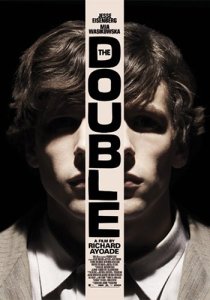My rating: 9
IMDB rating: 7.2
IMDB link: http://www.imdb.com/title/tt1825157/?ref_=ttmd_md_nm
Dearest reader,
I want to start by quoting Alan Scherstuhl in the Village Voice:
The Double, with its inviting alienation, nails a curious mood that’s been too long absent from contemporary film: the anxious admission that the world might be weighted against the plucky individual.
From the very start, this film starts you on a disjunctive journey, marked by inexpiable cyclical events, disturbing identity misunderstandings and most interesting of all, the absurd doubling and then minimising of the main character.
This journey is supported by several themes, that not only builds the story line, but which form small sub-texts. Death, disassociation, alienation, identity, confusion, surveillance, need for recognition (both in the workplace and as a person) and love (or should I rather say, obsession?). Spaces are also important in this film; the alienated urban space reminds of an 1984-ish dystopia. The same is true for Hannah, Simon and James’ different apartments; it is minimalistic, urbanised and meager.
Adapted form Dostoyevsky’s novella with the same name, this is Richard Ayoade’s second feature film. Adapting one of these dark Dostoyevsky texts, is not an easy thing to do, but Ayoade successfully translates the gloom and doppelganger-weirdness that this film requires.
But, after some contemplation, I have started to wonder if this is truly a doppelganger film… What do I mean by this? Considering the groundbreaking research intellectuals have done on psychoanalysis in film, since we first understood Freud and repressed desires, another popular theory started to emerge, namely the Apparatus theory. Included in this is both Lacan’s mirror theory and a theory that stemmed from it and that is, something I’ve written often about in this blog, voyeurism.
In terms of Lacan’s mirror theory it is easy to see how seeing someone that looks exactly like you, stimulates that experience- the divided self. Is James therefore a doppelganger? Or is James, Simon himself, as a part of his divided, schizophrenic, fractured self? Something to contemplate..
Surveillance, spectatorship and voyeurism is another big part of this film. Simon constantly watches Hannah’s house, but he is also being watched (by the first man that commits suicide). Simon is stimulated by watching Hannah and her art, it is an example of the ultimate male, voyeuristic gaze.
There is also a denial of spectatorship as no one seem to notice Simon and no one also seem to notice that Simon and James look exactly the same. Simon also constantly need to sign in although he has been working there for seven years and eventually looks exactly like another colleague; it is a type of denial of identity.
Eisenberg kills this role; one is never unsure who is Simon or who is James, although they are constantly dressed the same. He really surprises in a more ‘serious’ role than we are use to seeing him in. Mia Wasikowska; I cannot get enough of this girl, she has this dark undercurrent that just fits the film perfectly. I cannot wait to see her in Madame Bovary later this year.
Want to read more on The Double? Try these…
Movie Review: The Double (2013).
http://blogs.indiewire.com/thompsononhollywood/the-double-richard-ayoade-review

